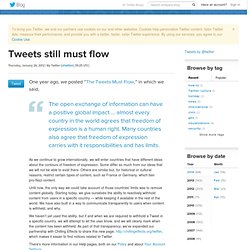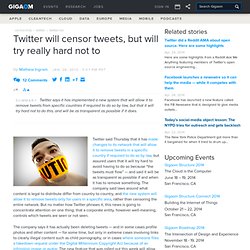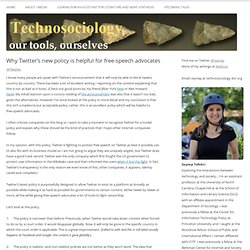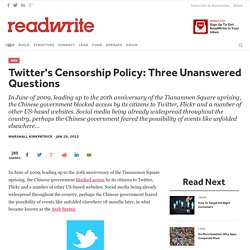

Twitter’s Chief Lawyer Defends Free Speech With Revenue in Mind.
Twitter: We’re still the free-speech wing of the free-speech party. BREAKING NEWS: Twitter Stands Up For One Of Its Users. Twitter has filed a motion in state court in New York seeking to quash a court order requiring it to turn over information about one of its users and his communications on Twitter.

This particular case involves a Twitter user, Malcolm Harris, who is being prosecuted by the District Attorney’s Office in Manhattan for disorderly conduct in connection with the Occupy Wall Street protest that occurred on the Brooklyn Bridge last year. This is a big deal. Law enforcement agencies—both the federal government and state and city entities—are becoming increasingly aggressive in their attempts to obtain information about what people are doing on the Internet. And while the individual Internet users can try to defend their rights in the rare circumstances in which they find out about the requests before their information is turned over, that may not be enough.
If Internet users cannot protect their own constitutional rights, the only hope is that Internet companies do so. Tweets still must flow. One year ago, we posted “The Tweets Must Flow,” in which we said, The open exchange of information can have a positive global impact … almost every country in the world agrees that freedom of expression is a human right.

Many countries also agree that freedom of expression carries with it responsibilities and has limits. As we continue to grow internationally, we will enter countries that have different ideas about the contours of freedom of expression. Some differ so much from our ideas that we will not be able to exist there. Others are similar but, for historical or cultural reasons, restrict certain types of content, such as France or Germany, which ban pro-Nazi content.
Until now, the only way we could take account of those countries’ limits was to remove content globally. Twitter will censor tweets, but will try really hard not to. Twitter said Thursday that it has made changes to its network that will allow it to remove tweets in a specific country if required to do so by law, but assured users that it will try hard to avoid having to do so because “the tweets must flow” — and said it will be as transparent as possible if and when it has to remove something.

The company said laws around what content is legal to distribute differ from country to country, and the new system will allow it to remove tweets only for users in a specific area, rather than censoring the entire network. But no matter how Twitter phrases it, this news is going to concentrate attention on one thing: that a corporate entity, however well-meaning, controls which tweets are seen or not seen. Twitter promises to be transparent and open One of our core values as a company is to defend and respect each user’s voice. [UPDATED] Twitter May Censor Certain Tweets In Certain Countries. Twitter caves to global censorship, will block content on country-specific basis as required.
Twitter Now Able To Censor Tweets, If Required By Law, On A Country-By-Country Basis. Until now, Twitter’s not had the ability to censor certain tweets or accounts, to prevent them from being seen — if legally required — by users in particular countries.

That’s now changed, though Twitter stresses that it hasn’t yet used this new ability and that should it have to, anything withheld will be disclosed. Twitter has shared the news on its blog, saying: As we continue to grow internationally, we will enter countries that have different ideas about the contours of freedom of expression. Some differ so much from our ideas that we will not be able to exist there. Others are similar but, for historical or cultural reasons, restrict certain types of content, such as France or Germany, which ban pro-Nazi content. These types of censorship demands have long been placed against search engines like Google or anyone who hosts content (such as through Google’s Blogger). Censorship At Google. Twitter isn't Censoring You. Your Government is. It’s barely been a day since Twitter made the announcement that, going forward, tweets could be censored based on the local laws that govern a user’s location, and the rumour mill is hard at work trying to figure out the reasons behind the decision.
At the same time, many Twitter users are calling for a Twitter Blackout on January 28, vowing to keep Twitter quiet tomorrow. While Twitter cited the example of the ban of pro-Nazi content in Germany and France, could there be more to it than meets the eye? Why is Twitter doing this? Taking a look at the hashtag, #TwitterCensored, a lot of fingers were very quick to point straight at the recent investment by Saudi Prince, Alwaleed bin Talal, without considering the fact that his stake in the company is a mere 3%. Thoughts on Twitter’s Latest Move.
Why Twitter’s new policy is helpful for free-speech advocates. I know many people are upset with Twitter’s announcement that it will now be able to block tweets country by country.

There has been a lot of excellent writing / reporting on the content explaining that this is not as bad as it looks. (Check out good posts by my friend Jillian York here or Alex Howard here). My initial reaction upon a cursory reading of the announcement was also that it wasn’t too bad, given the alternatives. However I’ve since looked at the policy in more detail and my conclusion is that this isn’t a mediocre but acceptable policy; rather, this is an excellent policy which will be helpful to free-speech advocates. I often criticize companies on this blog so I want to take a moment to recognize Twitter for a model policy and explain why these should be the kind of practices that I hope other Internet companies follow.
This is the same situation as... Twitter Takes First Country-Specific Censorship Action, Against Hate Group In Germany. Earlier this year, Twitter added the ability to block Twitter accounts and tweets by a country-by-country basis, in case it needed to respond to legal requests.

Nine months later, the company has done this for the first time, for a hate group based in Germany. The Financial Times spotted the action and reported it in a blog post today. The story come out of information Twitter sent to Chilling Effects last month, part of Twitter’s mechanism for being transparent about censorship requests. The Chilling Effects filing reveals that a Germany ministry (the Ministry of the Interior for Lower-Saxony) had banned the “Besseres Hannover” organization. The group, “Better Hanover” in English, is apparently a neo-Nazi organization, which are not allowed under German law.
As part of the disbanding, the ministry also ordered that its social media account be seized. The organisation “Besseres Hannover” uses the Twitter account…. But that’s because I’m in the US. Three Unanswered Questions. In June of 2009, leading up to the 20th anniversary of the Tiananmen Square uprising, the Chinese government blocked access by its citizens to Twitter, Flickr and a number of other US-based websites.

Social media being already widespread throughout the country, perhaps the Chinese government feared the possibility of events like unfolded elsewhere 18 months later, in what became known as the Arab Spring. Dick Costolo: Twitter Isn't Looking to Censor Anyone - Ina Fried - Dive Into Media. Twitter's early-bird special on censorship. Photo: Sabeth Last week, Twitter announced plans to censor tweets in specific countries, but only to local readers.

At the same time, it committed itself to publishing each act of censorship at the Chilling Effects clearinghouse. Assailed by critics, Twitter pointed out that the new policy puts it ahead ahead of competitors which removes postings without disclosure. Defenders also pointed out the company's proven record of defending users' rights and standing up to legal pressure. Insisting that transparent censorship is better than secret censorship, Twitter also published a tranche of copyright takedowns it had received; a taster of how the system will work.